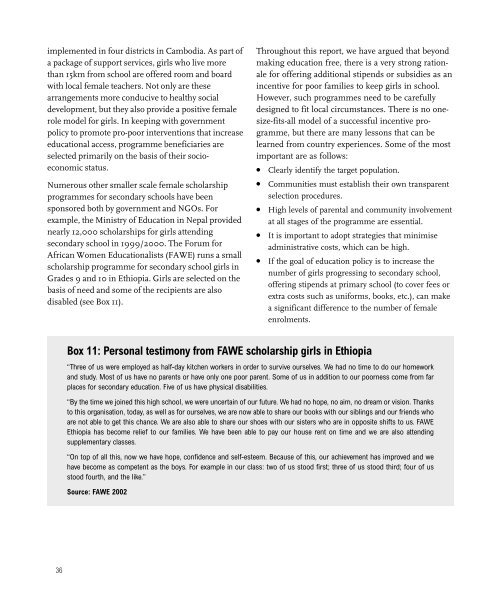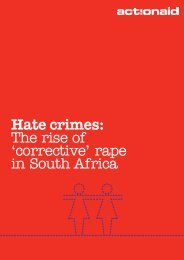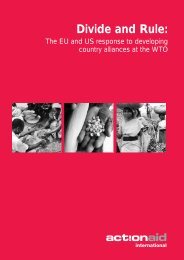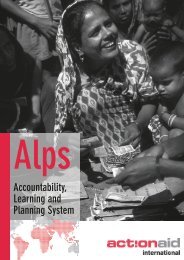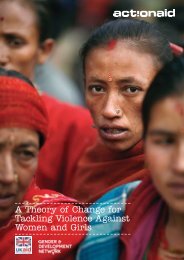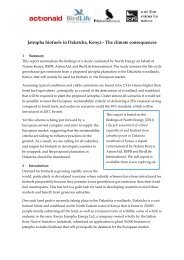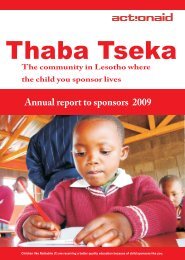implemented in four districts in Cambodia. As part ofa package of support services, girls who live morethan 15km from school are offered room and boardwith local female teachers. Not only are thesearrangements more conducive to healthy socialdevelopment, but they also provide a positive femalerole model for girls. In keeping with governmentpolicy to promote pro-poor interventions that increaseeducational access, programme beneficiaries areselected primarily on the basis of their socioeconomicstatus.Numerous other smaller scale female scholarshipprogrammes for secondary schools have beensponsored both by government and NGOs. Forexample, the Ministry of <strong>Education</strong> in Nepal providednearly 12,000 scholarships for girls attendingsecondary school in 1999/2000. The Forum forAfrican Women <strong>Education</strong>alists (FAWE) runs a smallscholarship programme for secondary school girls inGrades 9 and 10 in Ethiopia. Girls are selected on thebasis of need and some of the recipients are alsodisabled (see Box 11).Throughout this report, we have argued that beyondmaking education free, there is a very strong rationalefor offering additional stipends or subsidies as anincentive for poor families to keep girls in school.However, such programmes need to be carefullydesigned to fit local circumstances. There is no onesize-fits-allmodel of a successful incentive programme,but there are many lessons that can belearned from country experiences. Some of the mostimportant are as follows:● Clearly identify the target population.● Communities must establish their own transparentselection procedures.● High levels of parental and community involvementat all stages of the programme are essential.● It is important to adopt strategies that minimiseadministrative costs, which can be high.● If the goal of education policy is to increase thenumber of girls progressing to secondary school,offering stipends at primary school (to cover fees orextra costs such as uniforms, books, etc.), can makea significant difference to the number of femaleenrolments.Box 11: Personal testimony from FAWE scholarship girls in Ethiopia“Three of us were employed as half-day kitchen workers in order to survive ourselves. We had no time to do our homeworkand study. Most of us have no parents or have only one poor parent. Some of us in addition to our poorness come from farplaces for secondary education. Five of us have physical disabilities.“By the time we joined this high school, we were uncertain of our future. We had no hope, no aim, no dream or vision. Thanksto this organisation, today, as well as for ourselves, we are now able to share our books with our siblings and our friends whoare not able to get this <strong>chance</strong>. We are also able to share our shoes with our sisters who are in opposite shifts to us. FAWEEthiopia has become relief to our families. We have been able to pay our house rent on time and we are also attendingsupplementary classes.“On top of all this, now we have hope, confidence and self-esteem. Because of this, our achievement has improved and wehave become as competent as the boys. For example in our class: two of us stood first; three of us stood third; four of usstood fourth, and the like.”Source: FAWE 200236
Ensuring girls’ safety anddignity at school‘While societal and family issues are important, the presenceof a vibrant and happy school in the neighbourhood candramatically change the way communities view educationfor their children.’ (India report)The low quality of basic education has beenrecognised as a fundamental constraint in expandinggirls’ education in virtually every country. From agender point of view, quality means creating afunctioning and positive school environment inwhich girls can learn. We have reviewed above anumber of interventions that have been attempted,with very limited success, to make schools ‘girlfriendly’,reduce female dropout, and improve girls’learning attainment. Given the enormity of the taskand the difficulty of making an impact, werecommend that governments start with the basics:stamping out the sexual intimidation and harassmentof girl pupils, and providing basic facilities for theirsafety and dignity. Unless and until theseprerequisites are in place, more ambitious targets forimproving quality are unlikely to be achieved.Governments that are serious about getting girls intoschool must prioritise the provision of toilets andrunning water above other infrastructureimprovements. Although facilities in mosque schoolsin Pakistan are generally much worse than those ofmost government schools, they attract girls in equal orgreater numbers to ‘better’ government schools – anoutcome that puzzled researchers until theydiscovered that mosque schools are not only cheaper,but almost always have running water and sanitaryfacilities (Rugh 2000).Dealing with sexual harassment and intimidation ofgirl pupils is an uphill struggle in most countriesbecause it means challenging deeply-entrenched maleattitudes towards female sexuality; but, by the sametoken, it is very difficult to see how schools can everbecome ‘girl-friendly’ as long as such attitudes andpractices are allowed to persist (see Box 12).Linked to the problem of sexual harassment, in manycountries girls who get pregnant, often as a result ofunwanted encounters with teachers or male pupils,are penalised by being forced to drop out of school(while the baby’s father seldom faces any kind ofBox 12: Fighting sexual harassmentWolmera Primary School in Addis Ababa, the capital of Ethiopia, has over 1,000 pupils. Harassment of female students, childlabour, abduction and rape are some of the harmful practices in the school. Solutions to these problems have been proposedby the school’s Girls Club. Teachers, NGOs, community members, students and the police force are also involved in fightingsexual and other types of harassment. Teachers give staff training by picking some agendas that are educative and givelectures on some of the harmful practices both for other staff members and the students.Female teachers provide sex education and discuss the problems that arise because of their gender. There was one incidentthat took place just prior to the arrival of the team of experts. A girl named Tigist in Grade 3 had stopped attending school.The incident was reported to the Girls Club. The club members followed it up and found out that the girl had been raped atthe school by an 18-year-old student, who was in Grade 4. The girl was brought back to school and the boy was taken intopolice custody the same day. The father of the girl was contacted and brought in for discussions with the director.In another incident, a girl was forced to marry against her will. The Girls Club intervened and succeeded in getting a divorceand the girl resumed her studies. Another girl was forced to quit class because of repeated harassment. After a year ofabsence, she was approached by her teachers and club members and continued school. Girls are encouraged to participatein all extra curricular activities including sports. The family Planning club provides sex education especially for those girls whoare older and are still in lower grades.Source: Ethiopia report.37


